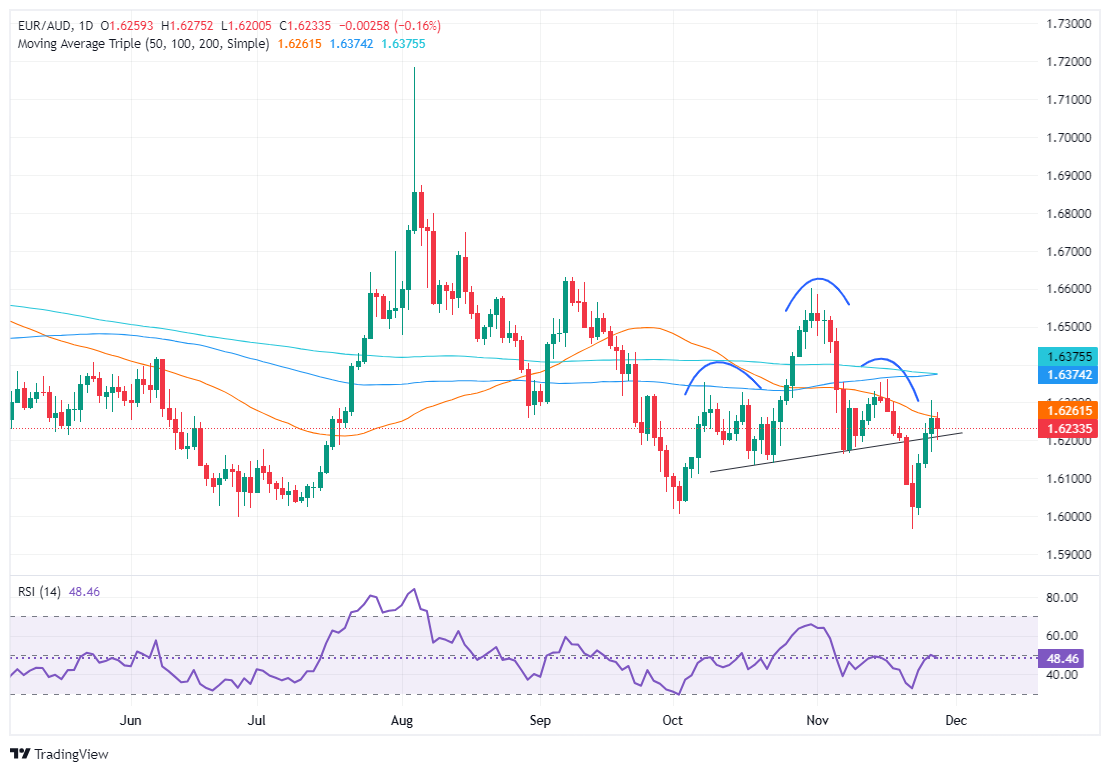- EUR/AUD falls 0.20%, influenced by expectations of ECB policy easing.
- Technical indicators show a shift to neutral as EUR/AUD invalidates head-and-shoulders pattern.
- Key resistances await at 1.6254 (50-day SMA) and 1.6300; supports positioned at 1.6168 and 1.6003.
- Support level are seen at 1.6200, 1.6168 and 1.6003.
The Euro took a hit and dived against the Australian Dollar as traders seemed convinced that the European Central Bank (ECB) would lower borrowing costs at the upcoming meeting. The chances of the ECB cutting 50 basis points remain, as most Eurozone economies remain subdued. At the time of writing, the EUR/AUD trades were at 1.6231, down 0.20%.
EUR/AUD Price Forecast: Technical outlook
The EUR/AUD shifted from a downward to a neutral bias. Once prices cleared the head-and-shoulders (H&S) chart pattern’s neckline, the H&S was invalidated, indicating that buyers' bulls were gathering momentum.
On its way north, the EUR/AUD found acceptance at 1.6200 before extending its gains, but bulls must reclaim the 50-day Simple Moving Average (SMA) at 1.6254 to keep their hopes of testing 1.6300.
Conversely, if bears move in and push the EUR/AUD below the H&S neckline below 1.6200, this could pave the way for further downside. On that outcome, the first support would be the November 27 low of 1.6168, followed by the November 25 daily low at 1.6003.
EUR/AUD Price Chart – Daly
Euro FAQs
The Euro is the currency for the 19 European Union countries that belong to the Eurozone. It is the second most heavily traded currency in the world behind the US Dollar. In 2022, it accounted for 31% of all foreign exchange transactions, with an average daily turnover of over $2.2 trillion a day. EUR/USD is the most heavily traded currency pair in the world, accounting for an estimated 30% off all transactions, followed by EUR/JPY (4%), EUR/GBP (3%) and EUR/AUD (2%).
The European Central Bank (ECB) in Frankfurt, Germany, is the reserve bank for the Eurozone. The ECB sets interest rates and manages monetary policy. The ECB’s primary mandate is to maintain price stability, which means either controlling inflation or stimulating growth. Its primary tool is the raising or lowering of interest rates. Relatively high interest rates – or the expectation of higher rates – will usually benefit the Euro and vice versa. The ECB Governing Council makes monetary policy decisions at meetings held eight times a year. Decisions are made by heads of the Eurozone national banks and six permanent members, including the President of the ECB, Christine Lagarde.
Eurozone inflation data, measured by the Harmonized Index of Consumer Prices (HICP), is an important econometric for the Euro. If inflation rises more than expected, especially if above the ECB’s 2% target, it obliges the ECB to raise interest rates to bring it back under control. Relatively high interest rates compared to its counterparts will usually benefit the Euro, as it makes the region more attractive as a place for global investors to park their money.
Data releases gauge the health of the economy and can impact on the Euro. Indicators such as GDP, Manufacturing and Services PMIs, employment, and consumer sentiment surveys can all influence the direction of the single currency. A strong economy is good for the Euro. Not only does it attract more foreign investment but it may encourage the ECB to put up interest rates, which will directly strengthen the Euro. Otherwise, if economic data is weak, the Euro is likely to fall. Economic data for the four largest economies in the euro area (Germany, France, Italy and Spain) are especially significant, as they account for 75% of the Eurozone’s economy.
Another significant data release for the Euro is the Trade Balance. This indicator measures the difference between what a country earns from its exports and what it spends on imports over a given period. If a country produces highly sought after exports then its currency will gain in value purely from the extra demand created from foreign buyers seeking to purchase these goods. Therefore, a positive net Trade Balance strengthens a currency and vice versa for a negative balance.
Information on these pages contains forward-looking statements that involve risks and uncertainties. Markets and instruments profiled on this page are for informational purposes only and should not in any way come across as a recommendation to buy or sell in these assets. You should do your own thorough research before making any investment decisions. FXStreet does not in any way guarantee that this information is free from mistakes, errors, or material misstatements. It also does not guarantee that this information is of a timely nature. Investing in Open Markets involves a great deal of risk, including the loss of all or a portion of your investment, as well as emotional distress. All risks, losses and costs associated with investing, including total loss of principal, are your responsibility. The views and opinions expressed in this article are those of the authors and do not necessarily reflect the official policy or position of FXStreet nor its advertisers. The author will not be held responsible for information that is found at the end of links posted on this page.
If not otherwise explicitly mentioned in the body of the article, at the time of writing, the author has no position in any stock mentioned in this article and no business relationship with any company mentioned. The author has not received compensation for writing this article, other than from FXStreet.
FXStreet and the author do not provide personalized recommendations. The author makes no representations as to the accuracy, completeness, or suitability of this information. FXStreet and the author will not be liable for any errors, omissions or any losses, injuries or damages arising from this information and its display or use. Errors and omissions excepted.
The author and FXStreet are not registered investment advisors and nothing in this article is intended to be investment advice.
Recommended content
Editors’ Picks

AUD/USD: Upside appears capped at 0.6300 on Trump's tariff fallout
AUD/USD struggles to build on the previous day's rebound and remains below the 0.6300 mark early Wednesday, anticipating US President Trump's tariffs announcement later in the day. However, buyers continue to draw support from China's stimulus optimism and RBA's prudence on the policy outlook.

USD/JPY holds losses below 150.00 as traders await Trump's tariffs
USD/JPY stays defensive below 150.00 in Wednesday's Asian trading as traders turn cautious ahead of Trump's reciprocal tariffs announcement. A cautious market mood and BoJ Ueda's comments underpin the Japanese Yen, keeping the pair under pressure amid a subdued US Dollar.

Gold price holds comfortably above $3,100 amid trade jitters
Gold price attracts some dip-buyers following the previous day's retracement slide from the record high amid persistent safe-haven demand, bolstered by worries about a tariff-driven global economic slowdown. Furthermore, Fed rate cut expectations and the lack of USD buying interest offer additional support to the XAU/USD.

US Government to conclude BTC, ETH, XRP, SOL, and ADA reserves audit next Saturday
Bitcoin price rose 3% on Tuesday, as MicroStrategy, Metaplanet and Tether all announced fresh BTC purchase. However, BTC price is likely to remain volatile ahead of the anticipated disclosure of U.S. government crypto holdings, which could fuel speculation in the coming days.

Is the US economy headed for a recession?
Leading economists say a recession is more likely than originally expected. With new tariffs set to be launched on April 2, investors and economists are growing more concerned about an economic slowdown or recession.

The Best brokers to trade EUR/USD
SPONSORED Discover the top brokers for trading EUR/USD in 2025. Our list features brokers with competitive spreads, fast execution, and powerful platforms. Whether you're a beginner or an expert, find the right partner to navigate the dynamic Forex market.


